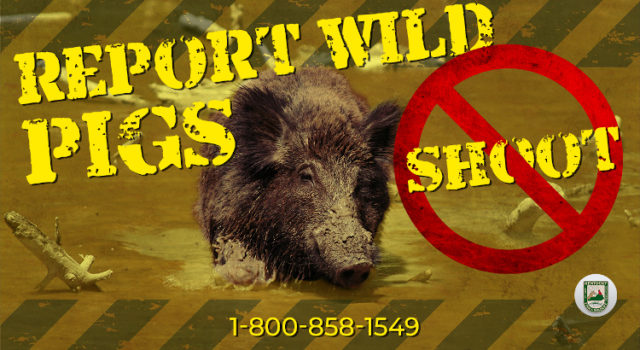

Our forests are home to many native wild animals, but they have been invaded by other animals as well, including feral hogs. Hogs are considered feral (or wild) when they are not marked to show ownership and are roaming freely. Feral hogs cause a wide variety of problems and are a serious concern for private landowners, fish and wildlife managers, and nature enthusiasts of all kinds.
Feral hogs are not wildlife and are a serious threat to fish, forests and wildlife as well as agricultural resources. Economic losses resulting from feral hog damage in the U.S. is estimated at greater than $1.5 billion per year. Feral hogs damage property, agriculture, and natural resources by their aggressive rooting of soil in addition to their trampling and consumption of crops as part of their daily search for food. Their diet regularly includes ground-nesting bird eggs, reptiles, and amphibians. They consume and destroy resources needed by other native species to survive.
Feral hogs have expanded their range in the U.S. from 17 to 38 states over the past 30 years. Their populations grow rapidly because feral hogs can breed any time of year and produce two litters of one to seven piglets every 12 to 15 months. Feral hogs are also known to carry diseases such as swine brucellosis, pseudorabies, trichinosis and leptospirosis, which are a threat to agriculture and human health.
Hunting feral hogs in Land Between the Lakes is illegal. Throughout the country, research and management efforts have shown that hunting does not control feral hog numbers. Specifically, hunting pressure causes hogs to go nocturnal and actually promotes their spread as they seek areas with less human disturbance. Successful control and removal efforts have very limited success when competing with concurrent pressure from recreational hog hunting. Instead, we are pursuing a cooperative strategy for intensive trapping and removal efforts to effectively control the hog population. Learn more about our feral hog management efforts in this 2/20/22 news release.

Wild pigs are an exotic, invasive species that pose serious threats to wildlife, wildlife habitat, natural areas, agriculture, and Kentucky hunting traditions. Hunting wild pigs may remove one or two but educates the rest and makes them more difficult to remove later. Wild pig sightings should be reported to the Kentucky Department of Fish and Wildlife Resources.
